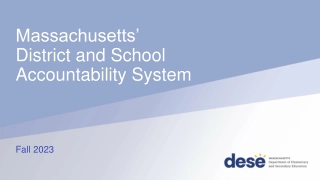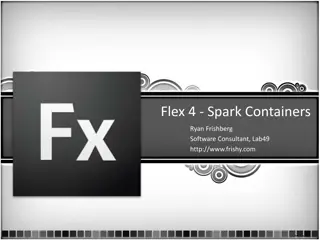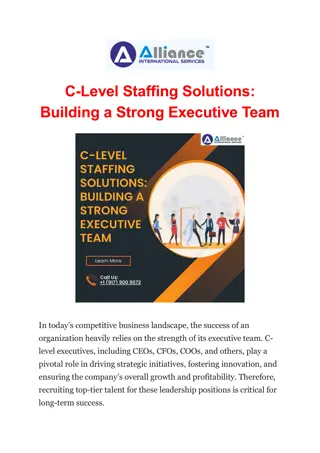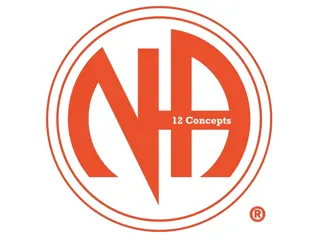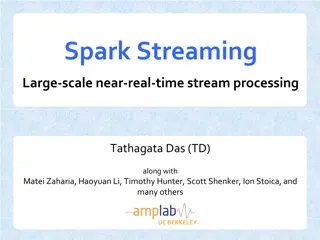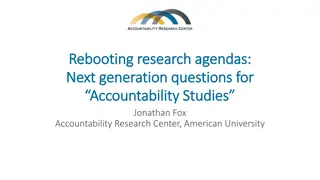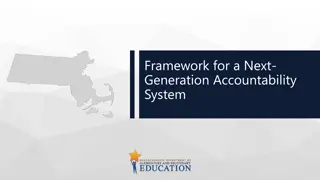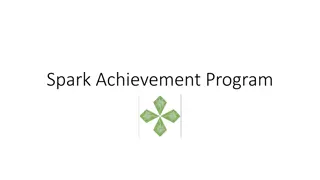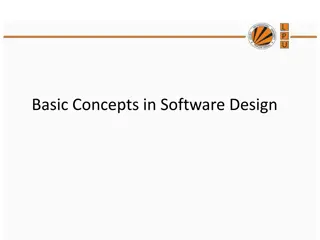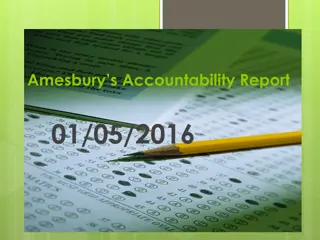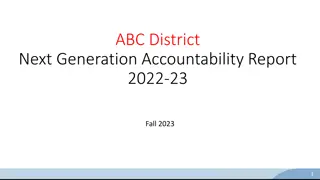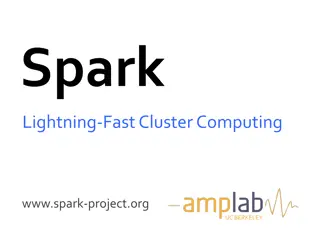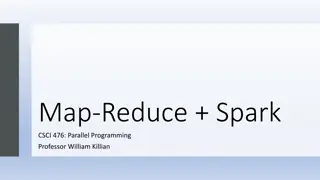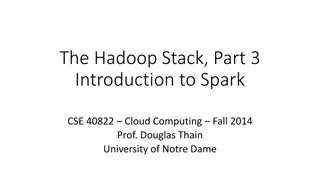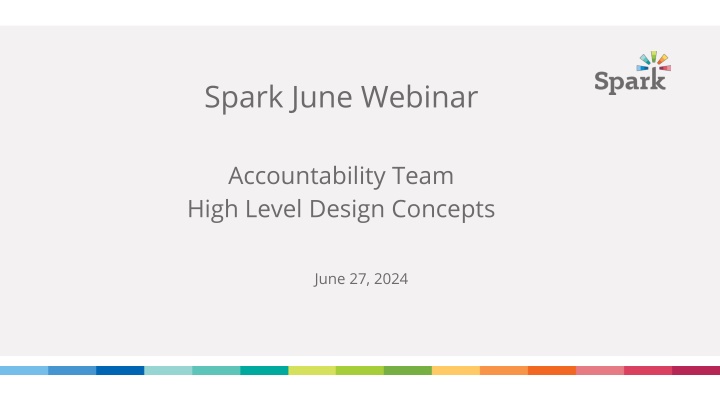
Spark June Webinar - Accountability Team High-Level Design Concepts
Join the Spark team as they discuss high-level design concepts related to accountability. Explore recommendations, guiding principles, eligibility criteria, and quotes that shape the Spark program's inclusive vision. Learn how Spark aims to connect children and families in Oregon with responsive early education and care. Discover the collaborative efforts to support providers and create a nurturing community for all participants.
Download Presentation

Please find below an Image/Link to download the presentation.
The content on the website is provided AS IS for your information and personal use only. It may not be sold, licensed, or shared on other websites without obtaining consent from the author. If you encounter any issues during the download, it is possible that the publisher has removed the file from their server.
You are allowed to download the files provided on this website for personal or commercial use, subject to the condition that they are used lawfully. All files are the property of their respective owners.
The content on the website is provided AS IS for your information and personal use only. It may not be sold, licensed, or shared on other websites without obtaining consent from the author.
E N D
Presentation Transcript
Spark June Webinar Accountability Team High Level Design Concepts June 27, 2024
Welcome and Introductions Spark Team ChienFei Huang Bilingual Administrative Project Specialist Ivette Guevarra Bilingual Project Specialist Marina Meaney- Lead Bilingual Project Specialist Lauren Peterson Spark Program Director
Spark Accountability Team Members Scope of work Recommendations* Shared with DELC on June 13th No approval or feedback from DELC until the end of summer
Guiding Principles Spark will offer support without judgment to all participants. Spark will support early educators in finding/creating a community where feelings of belonging are nurtured, and values are shared. Spark will support and empower families to find care that aligns with the needs, values, and culture of their family. Spark will empower early educators to make choices about their Spark journey, offering options for goal setting and achievement, accessing resources and measuring progress. Spark will validate that early educators and families will define quality differently. Spark will ensure that participating programs have met basic health and safety standards and will communicate this to families.
Spark Vision Statement The vision of Spark is to be a welcoming and inclusive program that strives to connect all children and families in Oregon with great and responsive early education, development, and care, by supporting and celebrating providers.
Quotes I just want to be recognized and validated. Prioritizing support. Tell us your story. We want you to be here, what do you want from us? What kind of support do you need? Include every program that wants to be included. Spark can be a good way to describe what a program is like (universal language). We need to limit barriers for folks to engage in participation throughout the entire process of the Spark system. Open Spark s door for everyone.
Recommendations All licensed and license-exempt* programs will be eligible to participate in Spark. *Licensed exempt programs include all types of recorded, regulated subsidy programs, and all license exempt providers that are regularly working with children and would like to participate in Spark.
Rationale The Spark vision is to be inclusive of as many programs as possible and support programs in providing the best possible early learning and care for children and families. Spark will support early educators in finding/creating a community where feelings of belonging are nurtured and values are shared.
Quotes Let Oregon get away from a system based on judgment and move towards support and celebrating. Prioritizing support. Tell us your story. We want you to be here, what do you want from us? What kind of support do you need? Spark should be a way to show what I am now (starting points and basic criteria) and what is my path for growth (additional advanced opportunities). Support without judgment- we aren t going to rate programs. The engagement cycle would share the story and allow programs to measure their growth/success.
Recommendations Spark will be structured as a non-rated tiered system with an emphasis on support and recognition. Tiers will be based on the level of participation* and will offer different types of support** for programs. *Tiers as a level of participation would consist of: Initial participation (when a program establishes/confirms its basic health and safety criteria are being met (see appendix) or uses its first engagement cycle to meet the requirement) Potentially one or several additional advanced tiers depending on the number of engagement cycles a program has completed. ** Different types of support mean intensified TA and access to Spark resources for initially meeting health and safety quality practices or other basic requirements (ORO account) on the first level and more detailed targeted support for establishing and achieving individual quality improvement goals on the next level(s).
Rationale Spark will empower early educators to make choices about their Spark journey, offering options for goal setting and achievement, accessing resources, and measuring progress. The first (basic) tier as the Initial level will create a possibility for all programs to participate in Spark, recognize them, give them resources to meet basic requirements, and make an avenue for them for future participation. Advanced tier(s) will give the programs the opportunity to highlight their strengths and growth by working on achieving their individual valuable goals. The non-rating approach will recognize individual accomplishments, highlight unique strengths, allow programs to be on their own path, create community and belonging by not comparing programs to each other, and not rush them to get to the highest tier.
Quotes Spark should be set for continuous participation. The most important is how Spark can keep programs engaged. We want this system to be inclusive so we want to build a framework that shows great guidance, meets programs where they are, and allows all programs to feel like they can participate. Individualism and space for all to feel included in this work. If there are some expectations for providers (to meet several criteria) there needs to be some support (including financial) upfront. That support intends to make that process equitable. (as a parent) When I am searching for a childcare program, I am not necessarily looking at their stars, but at what my family and children are related to. I will look for what aligns with my family's goals/values. I will choose a program if I see that their goals for kids are the same as mine. Education, equity, health, and safety have to be core categories for goal setting. It is necessary to offer some pathways /suggestions with particular guidance but also give the program opportunity/ability to ultimately choose what they want to do.
Recommendations Engagement Cycle An Engagement Cycle (EC) consists of 4 steps. They are Step 1- Goal Planning, Step 2 - Implementing, Step 3 Reflecting, and Step 4 - Evaluating
Rationale Spark will empower early educators to make choices about their Spark journey, offering options for goal setting and achievement, accessing resources and measuring progress. Spark will validate that early educators and families will define quality differently. Framework with Engagement Cycles will create a system that is: Streamlined and simplified Allow programs to work on their own goals that are specific and relevant to them Allows opportunities for feedback and support Offers programs the opportunity for a formal assessment or a more informal reflection of their program The Engagement cycle would provide an opportunity to highlight strengths. Offers choice to programs of which distinct content area they wish to work on. It will convey empowerment, flexibility, and respect for what each program wants to do.
Quotes Make programs accountable for what they have achieved/ been recognized for. Let the programs feel proud for what they are doing, let s praise them for their achievement and honor their values. We want Spark to be a system that recognizes engagement and progress. All programs are different; they do not need to be measured on the same criteria. Several of us are not interested in continuing with the stars as it is complicated... We would like to have a mentor who not only tells you what you lack, but who teaches you examples, explains, so that we do not have to copy others The current process keeps us frozen with Spark 's star tracking."
Recommendations Measurement of improvement will be redefined as a Measurement of Growth. Program progress will be measured by the program itself at the end of the engagement cycle. Programs will provide a reflective narrative of their growth while guidance will be provided to create consistency on what programs share and with the flexibility to fill in the specific information that is relevant for them.
Rationale Spark will empower early educators to make choices about their Spark journey, offering options for goal setting and achievement, accessing resources, and measuring progress Spark will validate that early educators and families will define quality differently. Recognize the value of professional development and program growth that programs are already engaged in by themselves or with their CCR&R coaches and count it as part of their participation in Spark. Let programs highlight their individual strengths and uniqueness and not categorize them by offering unvarying criteria, making them fill the boxes, and forcing them to submit universal evidence and meet mandatory requirements.
Quotes The type of documentation that we would ask providers to do for Spark should be accessible to parents to see (showcase to them) so that they can understand what programs are doing. Providers are developing their program for children and families, and not just trying to meet the marks of Spark portfolio. Previously Spark was an all or nothing setup. If programs are forced to do certain things then that isn t very supportive. Reduce the huge burden of (portfolio) submission. Let programs tell their own story . Offering various options of evidence submission to determine program work will make a system equitable and inclusive. Family feedback is a tool that providers could use to measure their outcomes and reflect on this.
Recommendations Spark will utilize a variety of ways for programs to document progress toward meeting their goals. Some examples include: Program visit such as observation or assessment Photographs, copies of policies, written descriptions, program marketing materials Sharing information via video or Zoom meeting (recording may be required) Head Start or OPK s strategic plan Families/community testimonials
Rationale Spark demonstrates its commitment to equity in documentation by accepting various types of documentation. This approach underscores Spark's appreciation for different documentation styles and formats. Spark offers users flexibility in choosing their preferred method of document submission, empowering them to select the approach that best fits their needs and workflow.
Quotes If this is about improving the Spark program, I would love the 3, 4 ,5-star rating to be changed. When my families were told that I had received a 3-star rating, their first question was always 3 out of how many. My parents chose my program for what makes my program unique more than stars. Star-rating system takes the focus off of the process and puts it on just getting to the next level. It also creates some assumption that one program is better than another. But it is not true. As providers, we are eager to race to reach a star. However, for providers, reflective practices have to be more important than meeting some general criteria and achieving a certain star level.
Recommendations Recognition will be given for the completion of an Engagement Cycle where programs have worked to accomplish specific goals relevant to their individual values and needs (instead of the overall generalization of having a star rating). Programs will be recognized with the receipt of a Certificate of Achievement with specific information regarding the program s activities. Programs will also receive a financial Recognition Incentive.
Rationale Spark will empower early educators to make choices about their Spark journey, offering options for goal setting and achievement, accessing resources, and measuring progress. Spark will validate that early educators and families will define quality differently. Spark will support and empower families to find care that aligns with the needs, values, and culture of their family. Replacing the star rating system with Certificates of Achievement for the completion of each goal cycle will recognize the individual strengths of every program and highlight programs achievements rather than meeting predetermined criteria and/or even failing in the pursuit of rating. This system can help parents see the unique values and strengths of a program and will emphasize what is important for families. Parents will be able to choose programs based on what is important to them.
7. Information for Families & Families Voice
Quotes The value and reputation of our program comes from our relationships with the families we serve. Whatever is built for families should be done with the family input vs. a creating a system on general ideas with hope that it will fit family needs Spark should be a listener of the community and providers and parents and then share back out to the larger system what is happening on the ground. What Spark wants to do is highlight elements of each program to showcase their work to help parents find a program that fits their needs. Parents need to be able to distinguish the different programs and what they offer. The badge system can help them to make conscious choices.
Recommendations Spark will create 2-way communication with families and communities to help them understand Spark s purpose and how the programs they are working with are involved. Accessible materials will be created in both print and digital formats in 5 languages, including places where families access services for their children. Spark will develop resources or tools for programs to effectively communicate their participation story with families. Spark will strive for maximum visibility on Find Child Care Oregon, making it easy for families to identify programs participating in Spark to the fullest extent possible.
Rationale Spark will support and empower families to find care that aligns with the needs, values, and culture of their family. Spark will validate that early educators and families will define quality differently. Spark will ensure that participating programs have met basic health and safety standards and will communicate this to families.
Thank you

